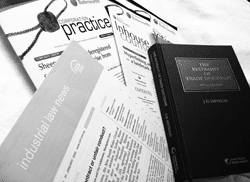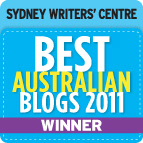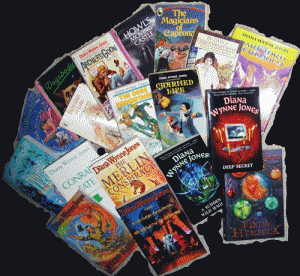It’s always great to head off to Canberra’s annual Conflux, where I can catch up with friends and make new ones. It’s a chance to find out what everyone’s up to and celebrate successes. There are parties and gatherings and just all-round fun.
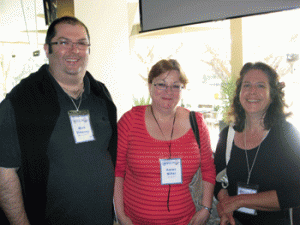
But for me it is also a chance to learn. Conflux may be a speculative fiction convention that draws and encourages fans of all flavours, but more than anything it is a celebration of writing; bringing together authors and publishers and readers in one spot. For all that I already spend a lot of time reading books and blogs about genre, writing, and publishing; events such as Conflux are an opportunity to hear experts and folks in the field speaking in person about their passion.
It’s a chance for me as an editor to discover what makes the worlds I wander through work so well, and to learn how writers understand their processes – so I can talk to them in their own terms when I am editing their words.
It’s also a chance for me to share the pearls of wisdom I pick up with other writers who may not yet have discovered writing communities or online resources. My incessant livetweeting during these events[i] is intended as much to help spread the word to them as it is to record/report the event as it happens. And spending time attending panels and talking to industry folk keeps me armed with the latest information to help new writers who often turn to me and other publishing professionals for advice.
This Conflux I not only followed panels, but also participated (because I was momentarily brave when filling out my registration form). I spent a late night with Patty Jansen, Ian Nicholls and Satima Flavell mumbling to a bleary-eyed audience of ten about whether self-publishers need editors (you can probably guess what I think about that). I think we mostly made sense, and even if we didn’t all agree, no one punched anyone and we’re all still friends. I also got to ramble about social media etiquette at the end of the con with Russell Farr, Zena Shapter, Alan Baxter and Alex Adsett. My favourite part of that was Jason Fischer repeatedly putting his hand up and prefacing every question with a promise not to pun. (Although I am pro-pun, as anyone who’s ever had to edit my magazine and newspaper heads can attest, so I was all for it…)
I also did my first pitching session for Etopia Press! That was an adrenaline-pumping hour – who knew five minutes could go so quickly? I can’t speak for the writers, but I really enjoyed that session as I met some lovely writers, heard some fantastic stories, and can’t wait to read more. I also chatted about pitching and the process thereof to a few people later on, so maybe I’ll blog on that topic down the track…
Topics I followed through the con…
Small press: I work with small, medium and mainstream publishers so this was a particularly interesting series of conversations, not least because so many innovative things are coming from small press in this changing publishing landscape. The mainstream versus small press smackdown highlighted the different considerations and approaches publishers and small press take – and the different challenges they face and the opportunities for their authors. There was a strong sense that small press like Ticonderoga have been able to take more risks and follow their hearts on “artier” projects in ways that mainstream publishers, driven by the bottom line, cannot. Marc Gascoigne described Angry Robot as medium press and was keen to take advantage of the ability to move faster than larger publishers on publishing projects and even marketing and promotional ideas.
Fantasy: I read and edit so much in this genre, and there are so many sub-genres within it – and they’re constantly changing and expanding.
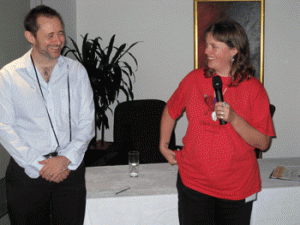
The panel examining the success and visibility of women in fantasy was particularly fascinating as this seemed to vary depending on country and subgenre. Indeed, while this panel was taking place, *this article* was going around Twitter; and many people have since been discussing the Strange Horizons survey. It was especially interesting to hear Trudi discuss her unexpected success in Poland, where she says publisher support and promotion meant her book tours made her feel like Stephanie Meyers.
Young Adult: Again this is a topic I followed as a fan and as an editor. Arguments about YA and what constitutes a YA novel seemed to permeate the whole convention – and you can log on to Twitter at any time of the day or night and bump into people discussing the subject. As the YA explosion panel explained, the fact that so many books originally published as “adult” titles have since been rebranded as “YA” only adds to the confusion. Garth Nix pointed out that it’s no surprise so many adults enjoy YA fiction – the word “adult” is right there in the name. The panel ultimately concluded that YA is story-driven and this will always appeal to readers.
Crime: It was a twist to see the “crime tropes” panel pop up in a speculative fiction convention, but the reason for this soon became clear with a quick poll that confirmed everyone present, speculative fiction readers all, also read crime. The success of last year’s first GenreCon already made it obvious that most genre readers probably cross the streams fairly readily, but it was impossible to determine from this sample crowd whether as many readers of crime also cross back to science fiction. This talk covered the difficulty of categorising crime novels when so many cross genres – Daniel O’Malley making the point that in “anything ‘other world’ a single drop will make it so, but a drop of blood does not make a book a crime novel” – and quickly led on to book covers and bookshop shelving (a topic which came up numerous times during and after the convention; frustrating more than one bookseller.)

Short story: I’m starting to edit more of these now I am working with digital presses – which have begun to accept and publish shorter works – so I was keen to learn from the experts what makes a short story successful and how the process differs for the writer compared with writing a novel. Lisa Hannett described short stories as “evoking more than they explain” and it was interesting to hear the panel describe the importance of the first paragraph or two of a short story – rather than the first line. Jonathan Strahan admitted a good first line made him suspicious as he’d then anticipate two pages wasted on justifying such an opening.
The business side of writing: In “facing reality” terms, this was one of the most valuable panels I attended. I often hear from new writers who plan, based on the first draft of the first thing they’ve ever written, to quit their job and live off their income as a writer. I know enough to talk them out of this,(!) but this panel took it to the next step. This was about the reality of being a career writer once you have been published. In many ways it was similar to workshops I have co-presented for freelance editors – the focus being less on the actual work you do (writing or editing) and more on the reality of what that life means: you will be running a small business. And you will be working alone. You have to be prepared, you have to be organised, and you have to know yourself. Karen Miller pointed out that while writing is a solo endeavour, publishing is a team sport and you need to know the roles of all the publishing people you work with. All the panellists agreed that publishing was just one step in a writing career and shouldn’t be the end goal because actually being published involves a lot of work and effort on the writer’s part.
Guests of Honour: I tried to attend as many guest of honour presentations as I could, although I missed more than I would have liked. Karen Miller’s photo presentation stood out in particular, showing how valuable a research trip can be and how differently a “standard” tourist tour of the castles and exhibits of Europe can be, viewed through a writer’s eyes. Under Karen’s guidance, stunning shots of a romantic, mist-swathed glassy river became the potential scene for a bloody ambush; an intricately engraved helm featuring the moulding of a bearded face became the enchanted armour for a king and so on. She showed us pictures of elaborate (and decrepit) doorways and encouraged us to imagine what sort of occupant might reside beyond, and further: how difficult (or how easy) others may find it to enter through such deceptively restrictive openings. The presence of tourists in the ancient dwellings served to add perspective – providing a measure by which we could see how humans have changed in height and girth (or not) and the challenges a character (and thus a writer) may face maneuvering within any given space.
Books about these places are easy to find, but Karen’s photo presentation made it obvious that these realities are much clearer when seen in pictures.[ii]
I also signed up to attend my first ever kaffeeklatsch – with Angry Robot’s Marc Gascoigne. I think everyone has been watching Angry Robot closely since they started as they’ve certainly been trying exciting new things and publishing fantastic titles – lots of Australian authors among them. Angry Robot are extremely online-savvy and one of the most important things I took away from the conversation, given the number of authors I have heard bemoaning the need to be on a blog, Twitter, Facebook, Goodreads, etc. was that the only thing that is a must-have for any author is a website. Nearly all publishers feature pages for their authors, but Marc pointed out that readers will go to Google, not a publisher, for the latest information about their favourite author. An author can keep all their information on their own site and be the obvious, official place for readers to go. Additional social media: blogging, Twitter etc. should only be undertaken with genuine interest. As our later social media panel discussed: readers and followers can instantly tell if you’re faking or marketing, so if you aren’t interested, don’t have time, or can’t be bothered: don’t do it – concentrate on the writing!
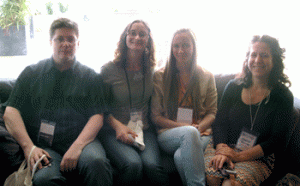
I think all the authors at the chat[iii] liked the idea of Angry Robot’s inclusive approach to publishing, which both Marc and his authors described as a kind of “family” with AR authors
encouraged to join in on their email loop for discussions about releases and covers, launches and signings. More than one writer mentioned later how isolated they had found their own publishing experience by contrast.
For myself, I think it’s imperative that any future office[iv] I move into comes equipped with underfloor caves like the AR offices. And cobbled streets outside, too. Or inside. I’m not picky.
In all this was another fabulous con. I met some wonderful new people and learned far more than I could ever condense into a single post. (Even one as epically long as this.) And I haven’t even touched on all the launches, readings and parties that took place between and after panels. Once again, this was a weekend of fun and enrichment that reconfirmed to me how lucky I am to work with the books and stories I love to read.
[i] Apologies to everyone who has been bombarded during this month’s Bothersome Words Conference Tweeting Extravaganza.
[ii] Or real life. I think we could all justify a holiday to somewhere that would help with our next writing/editing project: yes/yes?
[iii] And at the Angry Robot Hour held later in the con… I may have stalked Angry Robot a little bit…
[iv] House.


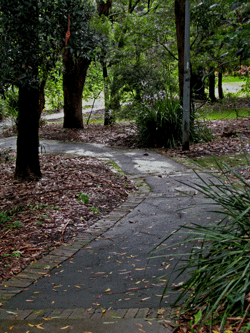
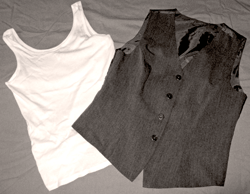
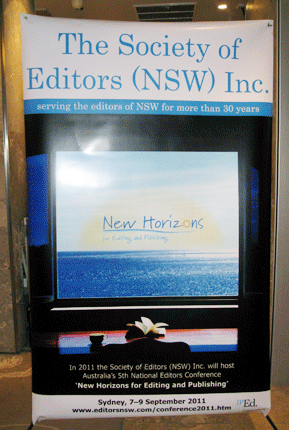 Conference
Conference